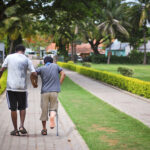All beings want to live in peace and happiness, undisturbed. Therefore the concept of human rights is universal. – Dalai Lama
What does that mean?
Unfortunately, the “all” needs the usual caveat about the people who aren’t quite normal, and don’t want these things. But the vast majority of all human beings do want to live in peace.
We also want to have happiness and be as undisturbed as possible. And while these two are primarily internal values, there are external forces which can make being so a bit of a challenge.
This quote is based on the concept of the similarities we possess as humans runs so much more deeply than our superficial differences as to completely overshadow them.
And that is why the quote ends with the statement that human rights are universal. They aren’t just for me, or for my friends, or the countries with which I get along. Everyone.
Why is the concept of universal important?
The concept of universal rights, or rights for all of humankind, isn’t new. But the work to bring them to everyone, not just the chosen few, is a bit more recent. Many times in history, rights have been granted across a large Kingdom or Empire, but rarely was it for every human. Just the chosen few.
This quote emphasizes that human rights are is the right of every human. No exceptions based on skin color. No exceptions based on religion. No exceptions based on country of origin. No exceptions whatsoever. That is what universal means. Everyone, all the time.
Yes, there are those who violate the rights of others. There must be consequences, and in doing so, there may be a need to violate some of those rights. That goes without saying. I don’t have a problem depriving someone to their right to happiness after they deprive someone else of their right to live, do you?
But absent specific and proven violation of the rights of others, everyone should be left alone as much as possible, so that they may be free to pursue peace and happiness to the best of their abilities. Everyone. Even the crazy cat lady, so long as she keeps the smell and the noise down, right?
Where can I apply this in my life?
To me, this quote is as much about what others owe you, as what you owe them. It’s one thing to get upset about the drum circle in the apartment upstairs at 3am. But what do you do that might be as disturbing to the peace and happiness of others? Have you ever thought about it?
It is not something most people tend to think about in their own pursuit of peace and happiness. That, unfortunately, is the unpleasant side of selfishness. Some just don’t care about what happens to others, as long as they get what they want, and that’s the worst kind of selfishness.
Most people are simply unaware or insufficiently skilled to notice what their actions are doing to others. At one time, many years ago, a friend was over at my apartment and tapping his feet with the beat of a popular song. It didn’t occur to me that the downstairs neighbor worked nights.
However, a few minutes later, there was a knock on my door, and there was the neighbor. To us, the tapping wasn’t disturbing our peace, and was part of our pursuit of happiness. However, to someone who was trying to sleep, it was quite disturbing. Since then, I am slightly more skilled. 8)
I imagine you could easily list a great number of times when others have violated your rights, in just the manner I described. But how often have you done the same to others? Not just the handful of times when you did it to spite someone, but all the times when it happened and you didn’t even notice?
To me, that is the place we most need to apply this quote. Yes, there are far more serious violations in other nations, and we can all feel free to do what we can to help, but what good does it do if we help the rights of others far away, while depriving our neighbor of theirs?
There is a limit to what we can do for others on the far side of the world, or even in other countries closer to home. But one thing we do have a great deal of control over is ourselves. Those of us old enough may remember the world banding together to fight apartheid, or (even older) Jim Crow laws.
But what can you do today, to help the most people, in the shortest time frame possible? Unless you have powers which can impact hundreds or thousands, even millions, of people remotely, you probably won’t be able to directly change something in another country. You can help, as best you can, but I recommend starting at home.
Take a moment and consider the things you do, and how they might impact others. Try to think of another way (or two or three) to get the same peace or happiness using a different method. Could you hum or snap your fingers instead of tapping your foot? Could you take the radio outside, perhaps with headphones, and tap your foot there?
Also think of some of the things others do which annoy you. It is one thing to simply yell at them to stop. It is far more useful to suggest they try a different method. If you don’t know what about it gives them peace or happiness, you might want to have a few options available for them to try. And try to stay away from the biological impossibilities, please. 8)
Live and let live, to pursue peace and happiness, with the minimum of interference. It’s a great way to live, if a slightly chaotic way to govern. As humanity matures, this will become more an option.
But for now, it is up to us, as individuals, to lead the way, and be the examples for others to follow. Are you willing to lead?
From: Twitter, @DalaiLama
confirmed at : it’s his own feed…
Photo by Matthew Hurst








Pingback: Cat lady | OneClickArena